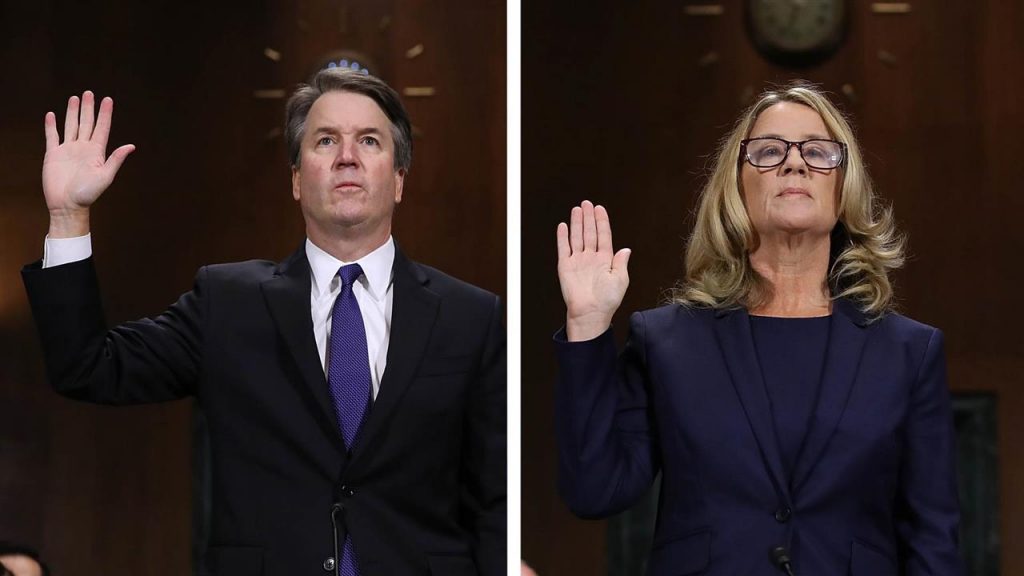The Rt. Rev. Mariann Edgar Budde, Bishop of the Diocese of Washington, published on Tuesday a public statement responding to the Ford-Kavanaugh testimonies. The text of the letter, in full, can be found below or on the Diocesan website and Facebook page.
The Diocese of Washington covers the District of Columbia as well as four counties in Maryland, including Montgomery County where Holton-Arms School and Georgetown Preparatory Academy, the alma maters of Dr. Christine Blasey Ford and Judge Brett Kavanaugh, respectively, are located.
A Bishop’s Response to the Ford-Kavanaugh Testimonies
October 02, 2018
“You will know the truth, and the truth will set you free.” John 8:23
Last summer I was among a group of Episcopal bishops asked to be pastorally responsive to women and men who had come forward to tell of their experience of sexual harassment and assault in the Church. The stories varied; the pain was universal. Many recounted in vivid detail the sexual trauma they had endured as children and adolescents.
At our Church’s national gathering, we read aloud some of their harrowing, heartbreaking stories. The crowd listened so intently that you could hear a pin drop in the convention hall. Their experiences of violation are seared into my soul, for they had endured the greatest violation of trust while in the Church’s care. And there was no one they could talk to when the abuse occurred. Added to their trauma was shame, for they were both violated and left to feel somehow at fault for what had happened to them.
Dr. Christine Blasey Ford’s testimony last week opened another floodgate of memories for women and men who have experienced sexual trauma. Many now feel emboldened to tell of their experiences and thank God for that. Others do not because they know it’s not safe for them to speak. Do you wonder why more women don’t come forward? As Dr. Ford testified, “My family and I have been the target of constant harassment and death threats. I have been called the most vile and hateful names imaginable.”
If you have experienced sexual violence and would like to talk to someone about it, please know that there are clergy and lay leaders throughout the Diocese of Washington, including your bishop, who will listen. We will listen without judgment. We will listen with compassion and gratitude to God that you survived. We will say to you now what you deserved to hear the moment the abuse happened: It was not your fault. This should never have happened to you. You are worthy of love and respect. You may write me confidentially, and I will make sure that someone will listen to your story.
Let me state another obvious truth: If, in fact, one in five, or even conservatively, one in ten women have endured sexual harassment or experienced the trauma of sexual assault, there are many men, and some women, who need to make a reckoning for their behavior. I’m not addressing those who angrily defend themselves or attack their accusers, but instead those who now sincerely regret what they have done. You, too, need to speak to someone and walk the path of remorse and restitution. No one, as criminal justice reformer Bryan Stevenson reminds us, is completely defined by the worst thing we have ever done. But we need to acknowledge what we’ve done in order to heal and to allow others to heal from the wounds. If you’d like to begin that process, we’re here for you as well.
I believe Dr. Christine Blasey Ford. I also believe that Judge Kavanaugh, like anyone who stands accused, deserves a fair process in response to such allegations. Regardless of whether Judge Kavanaugh’s appointment is ultimately confirmed, I am certain that the country will look back on these past weeks as a watershed moment. We will long remember the time when survivors like Dr. Christine Blasey Ford and others inspired by her bravery resolved to speak of their abuse and hold the perpetrators of sexual violence accountable.
For the sake of our daughters and sons we will exercise every means available to us to help make for them a better world: through prayer and spiritual support; education and community engagement; witness and protest when necessary; legal action and advocacy; and exercising our most basic civic duty of voting in every election. For those of us who follow the Way of Jesus, this is not merely a civic imperative, but a calling to bring this world closer to what Jesus called the Kingdom of God, where “mourning and crying and pain will be no more” (Revelation 21:4), and where love will triumph over hate.
Faithfully,
The Right Reverend Mariann E. Budde
Bishop of Washington

